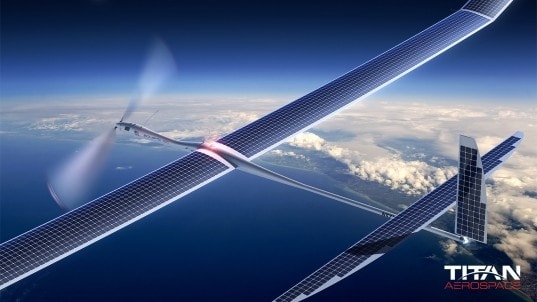
UPDATE: Gartner Report: Cloud Market is Growing Rapidly
December 29, 2014
Friday Fun Blog: The New Year Can Wait Edition
January 2, 2015Editor’s Note: The original article (posted below the line) was published on March 4, 2014. An update on the subject matter was sorely needed….
Is it just me, or does the word “drones” make you shiver a bit? We were able to wipe the sweat from Amazon had to re-think their drone idea (quick delivery, sure, invasion of privacy, not so much). However, Facebook seems to be moving full steam ahead with their drone ideas.
Mark Zuckerberg doesn’t want to deliver packages to your backyard, rather, he wants to give Internet to the world via solar-powered UAVs starting in 2015. Through Facebook’s partnership with Internet.org, the plan is to have unmanned aircraft beam the connection down to the rest of us. These drones are expected to be the size of a 747 jet, and fly for a long time (read: years).
The UAVs shouldn’t really interfere with our traditional flights though. Altitude is anticipated between 60,000 and 90,000 feet according to Mashable CEO Pete Cashmore. The initial focus is going to be placed on developing countries, where more than 15% of the population don’t have access to the world wide web. 21 countries in Latin America, Africa, and Asia have been identified, but testing will begin in a yet to-be-determined U.S. location.
The team is hoping to officially launch the project in the next 3 to 5 years, but there are multiple hurdles to jump over, including policy. You can’t just go flying planes and delivering Internet to the masses at your whim. You have to consult with different governments and law makers in each of the regions. This is also, more than likely, going to stir the pot when it comes to Net Neutrality.
Currently, drones are regulated and can’t be used for commercial use in the US. However, Amazon hasn’t quite given up yet, and even Google has an idea up their sleeves called Project Loon (as in balloons).
Internet.org is also partnered with companies Ericsson, MediaTek, Opera, Samsung, Nokia and Qualcomm, with the tagline “Every one of us. Everywhere. Connected.” Their additional projects include providing free basic services, and “Apps for the Entire World” which gives developers a way to make sure that their apps can work in even the most remote of locations.
While we love the idea of everyone having access to our favorite websites, we will wait and see what to think about drones being the method of delivery.
Original:
Facebook wants to bring the Internet to the world with DRONES…evil drones.
Facebook is on a spending spree, lately. First its $19 billion for WhatsApp, and now, Facebook is looking to get in the drone game with their potential purchase of Titan Aerospace. Why drones? Because Facebook is hoping to move forward with their Internet.org initiative of bringing the Internet TO THE WORLD.
Facebook’s drones
What is with companies and drones? First Amazon, then Netflix’s parody, and now Facebook’s drones—it’s a non-stop drone fest. Ain’t no party like a drone party because a drone party don’t stop what what what. Actually, I’m not opposed to Facebook’s drones because they’re using them for good. Titan Aerospace recently developed drones powered by the sun that have the ability to fly for 5 years without landing, and they also fly way above any commercial planes, at a near-orbital height of 60,000 feet.
The drones, according to Titan Aerospace, act as a cheaper satellite, given that they fly so high and don’t have to land. So what’s Zuck got up his sleeve for these drones? They’ll be using them and their solar powered satellite-ness to bring Internet to third-world countries and places that don’t have accessible Internet connections.
Currently, drones are regulated and can’t be used for commercial use in the US, but hey, if you don’t have Internet access in the US, that’s your fault. That’s why Zuck and Co., want to use these to go to regions where they don’t have Internet and where they don’t have regulations for drones. Choke on that, FAA. Another important distinction is that they can be classified as satellites which, if flying above 60,000 feet, would be out of range for FAA Class A airspace regulations. The only potential problem would be in the initial launch of the drone inside the US.
Facebook’s purchase of WhatsApp even ties into this: Their cheap messaging system and eventual voice calls coupled with Facebook’s Internet drones would bring cheap mobile data to regions where it’s not readily available. Good job, Mark!
If you’re a fan of finances and business and stuff, here’s something to wrap your head around: Facebook purchased WhatsApp—a simple messaging app—for $19 billion. Facebook looks to purchase a FUTURISTIC SOLAR-POWERED INTERNET-DELIVERING SATELLITE DRONE COMPANY for around $60 million.

